




honors individuals who have achieved their vocational goals by means of their own perseverance and with assistance from the West Virginia Division of Rehabilitation Services.
October 17, 2024 – 2 p.m.
Pisnu Bua-Iam, Director
West Virginia Division of Rehabilitation Services
Nitro High School Air Force Junior ROTC Color Guard
National Anthem
Makenna Hope
Rise Up
Makenna Hope Welcome
James Bailey, Cabinet Secretary
West Virginia Department of Commerce
Tara Martinez, Workforce Employment Program Administrator
Governor’s Office of Workforce Resiliency
Video and Awards Presentation
Pisnu Bua-Iam
Reception
Tara Martinez is an innovative leader with over 20 years of diversified experience, including 18 years in state government and eight years in nonprofit administration. She specializes in program growth, partnership building, business planning, and change management. Tara is proficient in governmental relations, policy development, financial administration, and grant management, with a strong track record in securing and managing federal, state, and nonprofit grants. Currently, she serves as the Workforce Employment Program Administrator at the Governor’s Office of Workforce Resiliency.
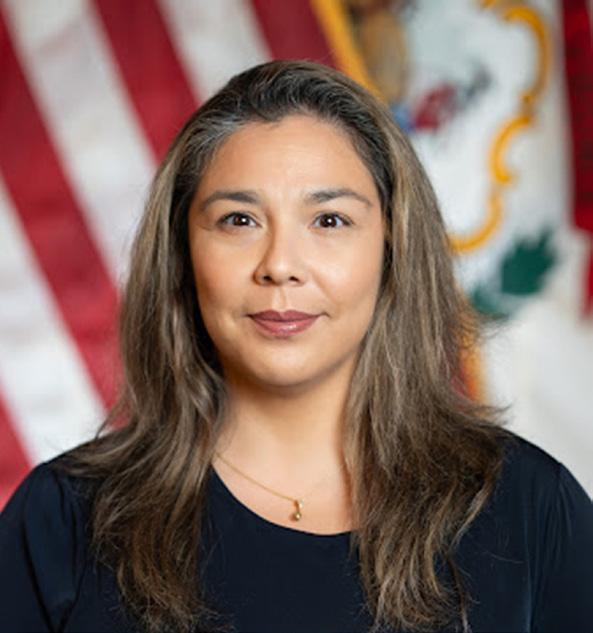
James M. Bailey was appointed the Cabinet Secretary of the Department of Commerce by Governor Justice on December 7, 2022. Prior to that appointment, Bailey was serving as the Acting Secretary of the Department of Commerce since July 2022 and previously was the Deputy Secretary since August 2021. He concurrently served as the General Counsel for the Departments of Commerce, Tourism, and Economic Development from August 2021 till his appointment as Cabinet Secretary.
Previously, Bailey served as the Counsel to the President of the West Virginia Senate from 2019 to 2021, where he was the chief counsel to the Senate and responsible for the management of staff and legislative business. Bailey served as Senior Counsel for Policy and Legislation to West Virginia Governor Jim Justice from 2017 to 2019. Bailey also served as Committee Counsel to the West Virginia Senate from 2015 to 2017 and as an Assistant Prosecuting Attorney in Kanawha County, WV from 2012 to 2015.
Bailey holds two degrees from West Virginia University, a B.S. in Journalism from the Reed School of Media (09’) and a J.D. from the College of Law (12’). He resides in Charleston, West Virginia with his wife Megan and their two sons, Jack and Henry.
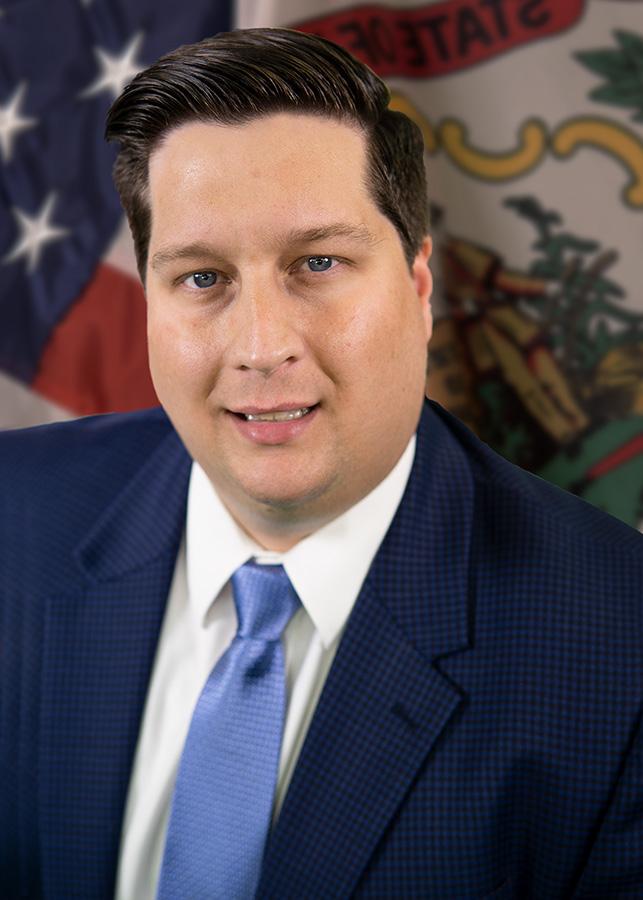
Pisnu Bua-Iam serves as Director of the West Virginia Division of Rehabilitation Services (DRS). Bua-Iam served as Acting Director from August 2021 through June 2022, when he was appointed Director. Prior to this, Bua-Iam served as the Deputy Director with oversight of Administrative and Support Services, Governmental and Public Relations, and State Plan and Program Evaluation for the agency.
Bua-Iam has more than 34 years of experience in the field of vocational rehabilitation. He came to the Division 20 years ago as the Manager of the Program Evaluation Unit.
Bua-Iam is a nationally recognized expert on program evaluation and return-on-investment of public vocational rehabilitation programs and has authored numerous journal publications. Bua-Iam has worked closely with the Workforce Innovation and Opportunity Act (WIOA) core partner agencies, WorkForce West Virginia and West Virginia Adult Education, in the development of the Unified State Plan for West Virginia since the passage of WIOA in 2014.
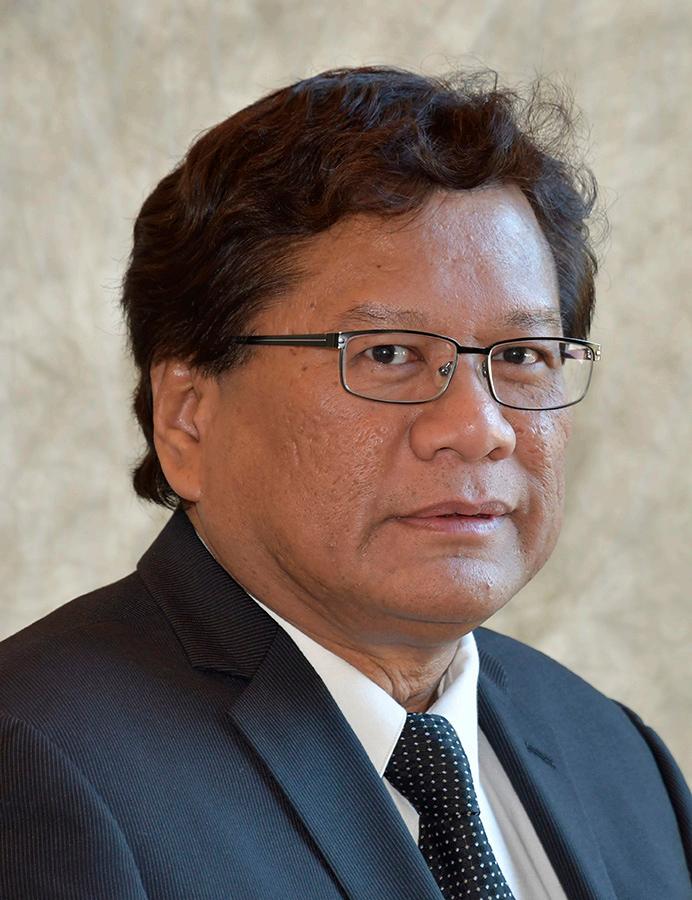
Bua-Iam has a Bachelor of Arts in economics from University of Maryland, College Park, and a Master of Arts in economics from the University of Nebraska, Lincoln, and he was a research instructor at West Virginia University for eight years.

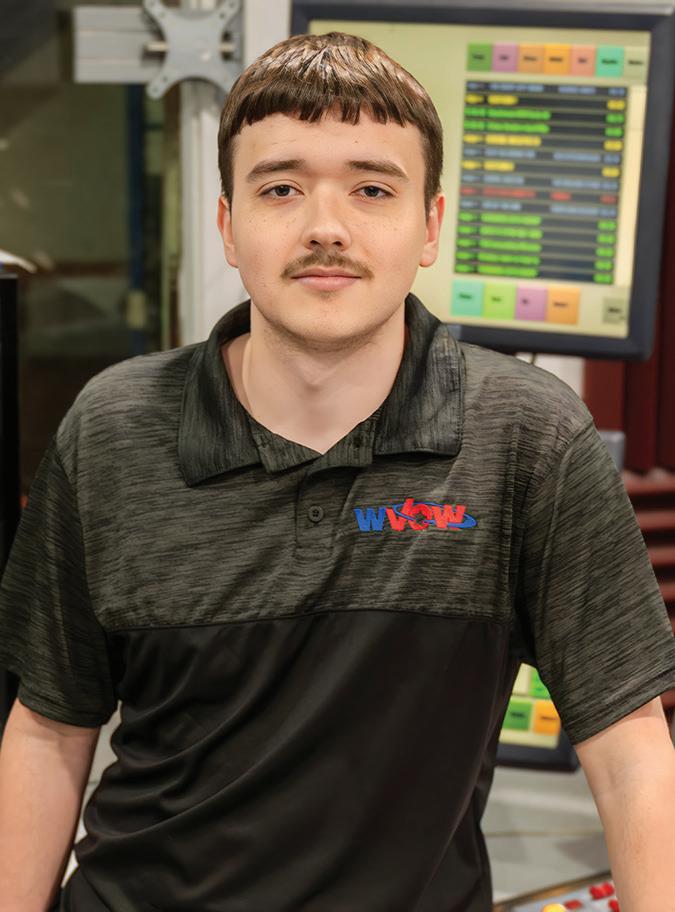
Tanner Thomas describes himself as someone with a lot to prove.
Tanner grew up in Coal Mountain. He graduated from Westside High School, located in Wyoming County, in 2020 during the height of the COVID-19 pandemic.
While in high school, Tanner was referred to the West Virginia Division of Rehabilitation Services (DRS) for assistance with transitioning from school to employment.
As a child, Tanner was diagnosed with highfunctioning autism, but he did not learn about
the diagnosis until he was 16, and it was completely by accident. He was at the dentist with his mom, and he saw where she had marked this information on a form under the disability section. He confronted her about it because he thought she was lying to the dentist.
Tanner recalls having to go through speech therapy when he was younger. He had difficulty speaking certain words, and he realized later that it was because of his autism.
According to Gina Ingram, DRS rehabilitation counselor, Tanner’s parents worked for the school system and were familiar with DRS, so they contacted Ingram about services for Tanner.
Ingram explained that Tanner participated in some pre-employment transition services through DRS, including career exploration activities and a hands-on work experience opportunity, while still in school.
Tanner tried college for a couple of years, attending Southern West Virginia Community and Technical College, where he earned a certificate in information technology.
But working on computers was not Tanner’s passion.
He was pleasantly surprised when DRS helped him find a job that really suited him.
Ingram was aware that Tanner had the opportunity to announce some of the high school baseball games. He stepped into the role when a buddy of his backed out.
Ingram thought Tanner had a great voice, so she and a DRS employment specialist were able to get the local radio station, WVOW out of Logan, to give Tanner a chance to prove himself through DRS’ on-the-job training program. Through this time-limited program, DRS reimbursed the radio station Tanner’s wages while he worked there, learning the job and gaining experience.
This temporary training opportunity turned into permanent employment for Tanner.
Tanner refers to himself as a radio host. Beverly Becker Bivins, president of Logan Broadcasting Corporation, indicated that Tanner’s title is onboard operator on-air talent.
Bivins explained that Tanner did his training at the station with other radio announcers and their program director.
His willingness to learn, along with his reliability and dependability, are some of his strongest qualifications, according to Bivins.
“Oh, he’s learned everything we’ve given him to do and taken on more responsibilities and never says no to anything,” Bivins said. “He’s willing to learn it all. He’s progressed very, very well.”
Tanner really enjoys his job, but he admits it was a little intimidating in the beginning.
“I host a music show in the afternoons,” Tanner
explained. “Somehow, they were ‘okay, you can do this.’ I didn’t have that much faith in myself. I knew I was going to do this eventually, and I wanted to do it. But with how fast the process went, I was pretty shocked that they were able to give that much reliability to someone my age, but I’m glad they did, and I will forever be grateful for that.”
Bivins believes Tanner is made for radio. She had been asked by some of her peers to see the voice on the radio, and it was Tanner they were talking about.
Tanner is very proud of his life, and he is humbled by the opportunities and support he has received.
“I would like to thank Gina, my DRS counselor, for helping me to get this job,” Tanner said. “I’d like to thank my parents for supporting me. I’d like to thank all of my friends who were there for me when others weren’t. And I’d like to thank my co-workers for treating me the way I like to be treated.”
Tanner plans to stay in the field, but in the future, he wouldn’t mind broadening his horizons and being heard across the nation. For now, Tanner just doesn’t want to become complacent.
“Well, I’m only 21 and no matter what I do and how much I accomplish, I just feel like there’s so much more, there’s always more,” explained Tanner. “There’s never an end goal. I have dreams, I have a career, and I have a future. There’s no stopping point. I pretty much go until I can’t.”
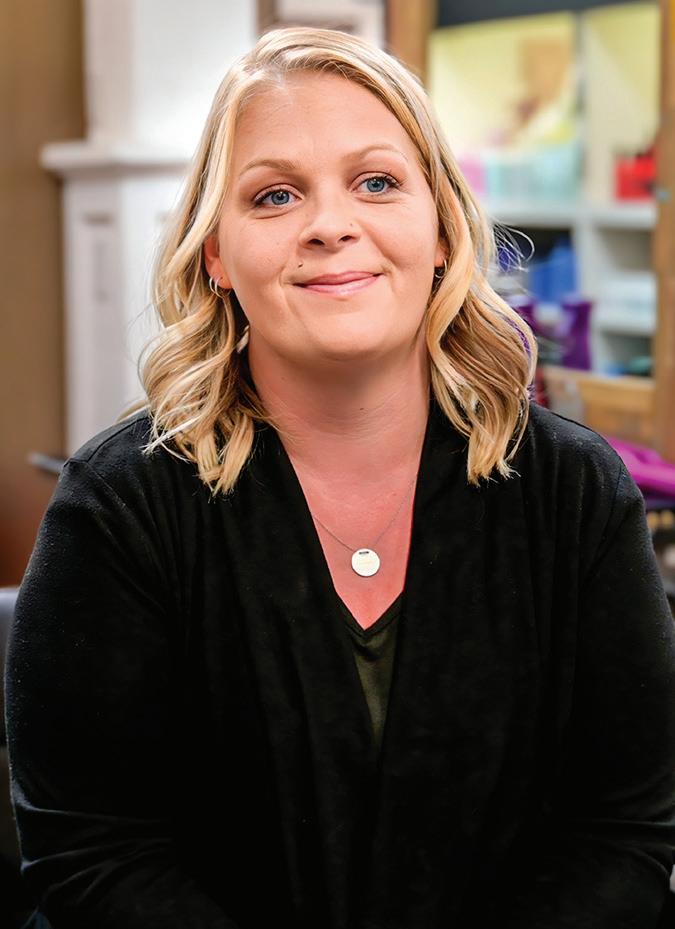
Andrea Pugh didn’t settle for what she was used to. She chose to go back to school after 14 years because she wanted a rewarding career that allowed her to financially contribute to her family.
Andrea moved to West Virginia from Ohio when she was 11 years old. She graduated from Union Educational Complex in Mount Storm in 2008.
During her 14-year break from school, Andrea focused on raising three children, two girls and a boy, with her husband. Her family is very important to her, and they are one of the reasons she chose to go back to school.
Andrea had been diagnosed with attention deficit hyperactivity disorder (ADHD) when she was in elementary school, but she was never treated for the condition. When she decided to go back to school, she approached the West Virginia Division of Rehabilitation Services (DRS) to see if she could receive assistance with her training and job placement.
As an adult, Andrea realized how much of an affect the ADHD had on her education when she was younger, especially when it came to taking tests. But DRS was able to help her when she went back to school for cosmetology.
“DRS helped me by making sure that I was at school when I was supposed to be and getting the things done that I needed to get done and keeping me on track,” Andrea explained. “Because my ADHD kind of keeps me out of control, DRS helped me stay on track with everything when it came to school.”
Billie-Jo High, Andrea’s DRS rehabilitation counselor, explained that Andrea was committed to earning her cosmetology license, and she worked hard in school. DRS was able to help pay for her training and for the cost of the licensure exams when Andrea was ready to take them.
While enrolled in the cosmetology program through Grant County Schools, Andrea met Amanda Rader, owner of Mane Street Studio, a full-service salon located in Keyser. Rader was one of the instructors for the program.
Andrea really looked up to Rader and started working as an assistant in her salon while she was in school. After completing her education, Rader offered Andrea a job as a stylist.
According to Andrea, she does eyelashes, pedicures, manicures and hair. But Rader credits Andrea with doing so much more and with being an exceptional team player. She also helps with ordering supplies and products, keeping the salon organized and motivating other team members.
Rader explained that Andrea has become a tier three stylist, which means she is highly skilled with advanced training.
“Basically, when you come right out of school you are at a very basic level,” Rader said. “She did very well in school. She was a great student in school. She took a lot of initiative to be a team player in school and take as many clients as she could and do what she could do to learn. And basically, coming here, of course, I house hairdressers that are at different tiers, so they have mentored her along with me mentoring her, and she has just picked up on everything very quickly and within a two-year period of time, she is an almost 100 percent booked stylist.”
Andrea believes her ADHD helps her when she is working. It seems to give her the energy to move from one thing to another.
Rader agrees Andrea’s condition tends to energize her.
“She has great people skills,” said Rader. “She is bubbly. People enjoy being around her. And honestly, I think that in our industry of building relationships and being friendly and making people feel welcome and all that, I think the more energetic that you are, the better off you are.”
Andrea is proud of herself for going back to school, and she is grateful to her family and Rader for helping her accomplish her goal to become a licensed cosmetologist.
“What I like most about my job is that I’m not always doing the same thing,” said Andrea. “It’s different people, different personalities and attitudes and different services that I provide.”
Andrea’s plans include continuing to work at the salon and growing her skills.
“I’m always pushed to do better and do more and be better,” Andrea said.
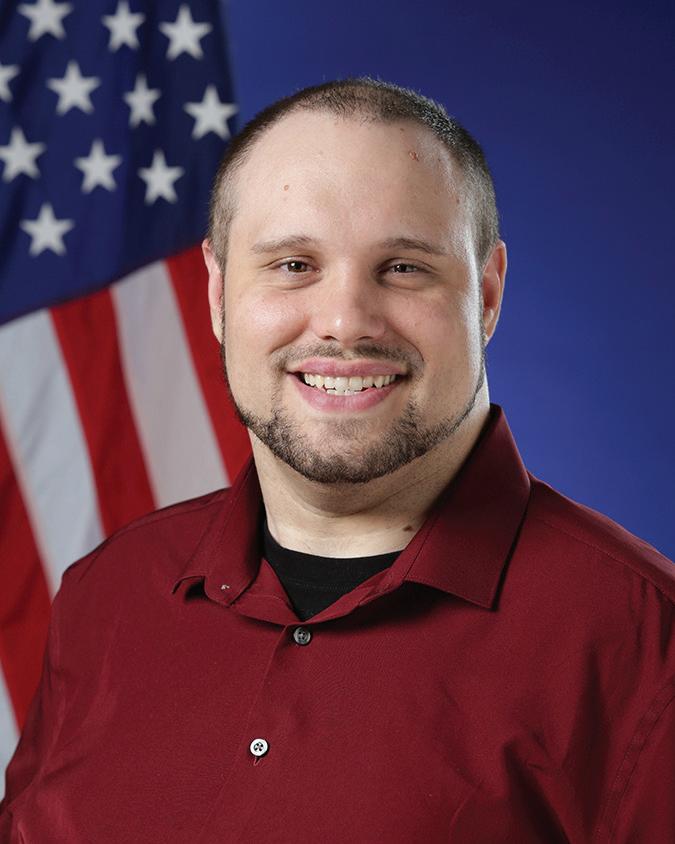
Dakota Walls describes himself as resilient, but he admits the trait is an acquired one.
Dakota’s world turned upside down in 2014 when he was shot during a domestic violence attack, which left him with a spinal cord injury.
He had graduated from Princeton High School in 2012 and had gone to work in the coal mines, an industry in which his family had a longstanding history. One of his favorite pastimes was working out at the gym. He cherished his independence.
But in an instant, Dakota’s life changed forever. His injury affected his ability to move all four of his limbs. Dakota spent five months at the Shepherd Center, a comprehensive rehabilitation facility in
Atlanta, Georgia. He had to adjust to the loss of his independence and learn how to rely on others for help with his daily activities.
While at the Shepherd Center, staff encouraged Dakota to pursue a college degree, which is something that had never interested him. They also urged him to seek assistance from the West Virginia Division of Rehabilitation Services (DRS).
After going home, Dakota quickly realized that spending the rest of his life watching television and playing video games was not an option. So, he connected with DRS, and he enrolled in Concord University.
According to Russell Hazelwood, Dakota’s rehabilitation counselor, DRS provided financial assistance for Dakota’s tuition and books so he could pursue his degree. DRS also helped Dakota with assistive technology needs to support his education.
In 2020, amid the global pandemic, Dakota earned his degree in business administration with an emphasis in accounting.
Dakota’s job search was a challenge. He applied for a lot of jobs, and he felt he had many successful job interviews. However, they never amounted to a legitimate job offer. Unfortunately, Dakota believes the small-town environment where he lived hindered his success. People knew his circumstances and saw his limitations rather than his capabilities.
But opportunity finally knocked when a human resources recruiter for the Army and Air Force Exchange Service found Dakota’s Workforce Recruitment Program (WRP) application. Managed by the U.S. Department of Labor’s Office of Disability Employment Policy and the U.S. Department of Defense, the WRP connects federal and select private-sector employers with recent college graduates with disabilities.
The Army and Air Force Exchange Service is the largest retailer for the Department of Defense. They have served customers with tax-free goods and services through different wars, regional conflicts, military exercises and natural disasters since 1895. One hundred percent of Exchange earnings support the military community.
Danielle Ross is a business systems analyst 3 on the finance and accounting process team at the Exchange, and she is Dakota’s supervisor.
According to Ross, they chose to hire Dakota as an intern, which is a temporary entry-level position, in 2022. However, just two years later, Dakota works full time as a business systems analyst, where he provides support for the e-commerce side of the business.
“His responsibilities include running all different types of test scripts for any type of code changes and enhancements that are done to any of our systems that impact accounting,” explained Ross.
“He gathers accounting requirements, writes business requirement documents, and he assists all other accounting areas that need any type of
training on the new processes that we implement. And one of the biggest things he does for the team is he serves as the liaison for all of our finance and accounting robotic process automation bots,” Ross further explained. “So basically, any manual process that has been automated by a bot and for finance and accounting, Dakota has facilitated that. He started it from scratch and then worked with the teams all the way to implementation and saved our company millions of dollars on some of these bots.”
As an accommodation, the Exchange granted Dakota an exemption to work remotely full time from his home in McDonough, Georgia, where he moved when he got his job.
Ross credits Dakota with being a top performer who is always taking on new challenges and more responsibility. She used words like motivated, problem solver, good communication skills, quick learner and exceeds expectations to describe him. She believes he will continue to excel and advance with the company.
Dakota is very appreciative of the help he’s received to get where he is today, and he is most proud of rebuilding his life after having to start over.
“Starting from nothing to something again is probably the biggest accomplishment to be honest,” said Dakota.
His advice to others is to “… keep going and do the best you can with what you have. Eventually, you will find your opportunity.”
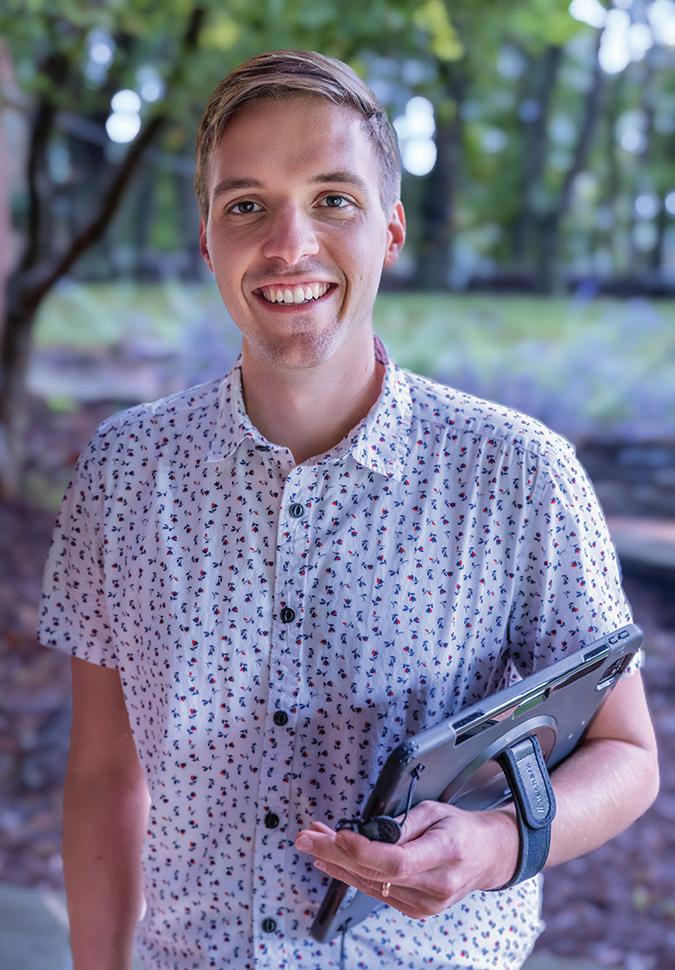
Elijah Goins is an entrepreneur and a risk taker with the willingness to do what it takes to accomplish his goals.
Growing up in St. Marys, a small town in West Virginia, Elijah was homeschooled for 12 years. Elijah’s mom had been diagnosed with a rare kidney disease, and her prognosis was uncertain. She didn’t want to miss out on his childhood, so she decided to homeschool him. He graduated in 2016.
Elijah did go on to college. He attended
Appalachian Bible College, where he earned a theology degree. He went to Liberty University and pursued aviation science. He did not complete this degree, but he did get his pilot license. And he obtained a business degree from West Virginia University Institute of Technology in 2021.
He was referred to the West Virginia Division of Rehabilitation Services (DRS) while attending Appalachian Bible College.
Elijah had been diagnosed with attention deficit hyperactivity disorder (ADHD), dyslexia and dysgraphia when he was being homeschooled. These conditions made learning and staying focused difficult. But in college, he wanted to learn and made an active choice that his disabilities were not going to prevent him from doing so.
According to Jennifer Surface, DRS employment specialist, DRS provided Elijah with financial support, including assistance with his tuition, books and supplies, at all three higher education institutions.
Elijah admits the financial assistance from DRS was crucial for him to be able to attend college because his family did not have the resources to fund his education. But he also welcomed the encouragement he received from the employees at his local DRS office.
Originally, Elijah began working at a gym, where he was paid minimum wage. After working the morning shift there, he would go mow lawns in the afternoon. He turned that initiative into his first business, Elijah’s Lawn Sculpting, which he ran for eight years.
He started his second business, Pilot Painting, because he thought he needed something to do during the winter months. At first, Elijah, the pilot, was doing the painting, but this business soon overshadowed his lawn care business, so he and his wife decided to focus solely on Pilot Painting.
Elijah’s business concentrates on interior and exterior painting for residential and light commercial jobs. As owner, he manages the company and handles sales. He also employs three additional full-time team members.
His responsibilities include taking care of payroll, taxes, sales calls and customer relations. He meets with prospective customers to take measurements and prepare cost estimates.
“I’m the CEO, Chief Everything Officer … I have my hand in every single part of this business,” said Elijah.
Elijah also considers his business to be a ministry. Their mission is to honor God, have a delighted customer and do a good job.
“I get to walk into places that I never would have imagined, talk to people about Christ, pray with people,” Elijah explained. “There have been homes that I’ve knocked on to see if they wanted painting, and the man walks out and says my wife is dying. And I get to stand there and say I’m so
sorry, can I pray with you? I stand and pray with the man and he’s crying.”
Elijah was a youth pastor for a short time but having the opportunity to care for his customers and his employees, that is his purpose and true ministry.
Surface believes Elijah to be conscientious and a really good person.
“He holds his Christian values very dear to his heart,” said Surface. “He wants to do a wonderful job, and he does. He exudes trustworthiness … He’s just one of the nicest people you will ever meet.”
When asked about accomplishments for which he is most proud, Elijah indicated the question was difficult to answer.
“I would much rather say that I enjoy my job because it is a ministry, and that’s not reliant on me,” Elijah said. “Yes, I have to go out and do it, but for it to rely on me, there is no pride in that. If there is, it’s false.”
Elijah likes the freedom and flexibility owning a business gives him to set his own schedule. His future may hold a new business endeavor that would allow him to care for his customers in a different way.
Elijah knows that he could not have accomplished any of his goals without God. He is also grateful to his mother for laying a strong foundation and for her unwavering encouragement and to his wife for her love and support during the most recent years of his life.
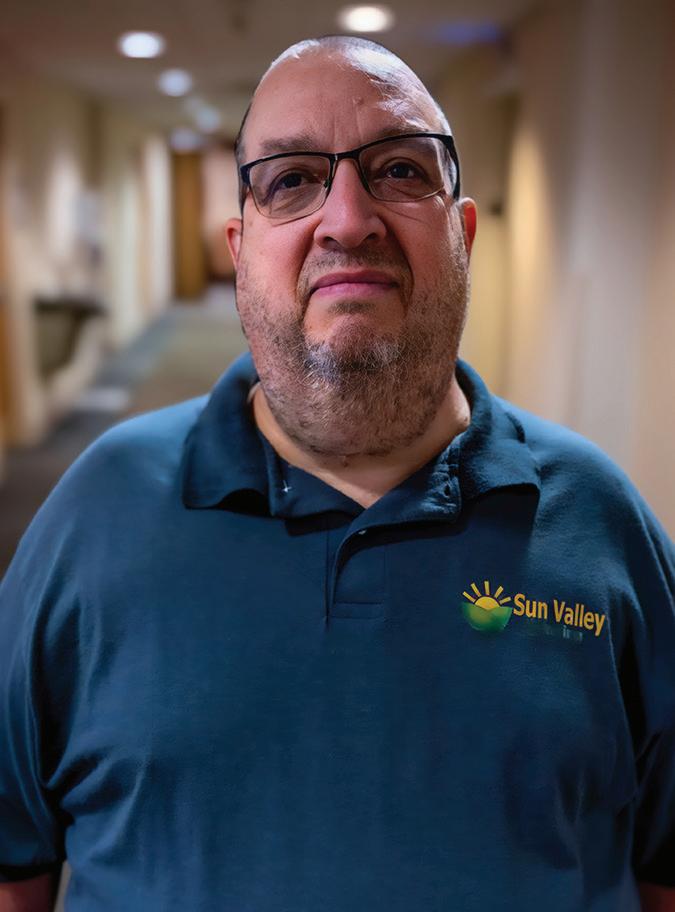
Having to change careers at any age can be difficult. But it can be devastating when you are over the age of 50, and you are losing your eyesight.
George Barnhart grew up in Chester, West Virginia, and he graduated from Oak Glen High School in 1983. He went on to earn an associate degree in network engineering, and later, while working full time, he obtained a bachelor’s degree from Robert Morris University in Pittsburgh in 2007.
He had a good job as an information technology project manager for Hewlett-Packard.
But while he was in his 30s, George was diagnosed with Stargardt disease, which is a progressive eye disease that caused him to lose his central vision and have limited peripheral vision. In 2019, his retina specialist deemed him to be legally blind.
George admits the disability drastically changed his life. He lost his job. He could no longer drive. The only way he could read was to have very large print text. And the changes continue to evolve.
According to Meredith Perry, George was referred to the West Virginia Division of Rehabilitation Services (DRS) by his ophthalmologist.
Perry, George’s DRS rehabilitation counselor, clarified that he got involved with DRS’ RandolphSheppard program because he did not want to sit at home doing nothing. He wanted to work.
Josh Gabehart, Randolph-Sheppard program manager, explained that DRS operates the program, which was created by federal law to provide individuals who are legally blind with gainful employment.
Through the program, DRS recruits individuals who are legally blind and then trains, licenses and places them into vending operations, snack bars and cafeterias that are located on federal and state government properties. Essentially, the program sets participants up to run a small business.
“The training consists of nine separate modulars and covers everything from managing a business, inventory control, human resources, maintenance of the equipment and other areas,” said Gabehart. “It’s work at your own pace. We don’t have a timeframe on it. We want them to learn the material and be successful entrepreneurs.”
George is the business owner and operator of Sun Valley Vending. He manages and supports 15 vending locations with about 100 vending machines located in and around the Charleston area. He also employs three people.
To help him overcome challenges and obstacles relating to his vision, George uses several tools on his job. ZoomText is software that enlarges and enhances everything on a computer screen. It also automatically reads aloud his email, webpages, documents and more. He also uses an iPad to help him see things or that can read things to him while he’s working in the field at one of his vending locations. Additionally, a specialized money sorter helps him to identify and count both bills and coins.
According to George, the Randolph-Sheppard training program is designed to help participants learn and understand everything about running a business so they can succeed. Through the program, DRS also provides him with a business counselor to help him address any ongoing concerns so his business can continue to thrive.
Perry believes George is outgoing, friendly and persistent, which are all characteristics that will help his business to grow.
George is most proud of graduating from college and raising a family.
“I was working a full-time job and going to college in the evenings, raising my two boys,” he said. “I’m very proud of that, and they’re very good boys.”
George is also proud of being able to own and operate his vending business. And he is grateful to Perry and the DRS Randolph-Sheppard program staff who helped and supported him during the training.
“I went there [to DRS] and spoke with them and got into the Randolph-Sheppard program, and this was the perfect thing for me,” George explained. “I had to do something. With the loss of my vision, there wasn’t a lot I could do, and this fit perfectly with me.”
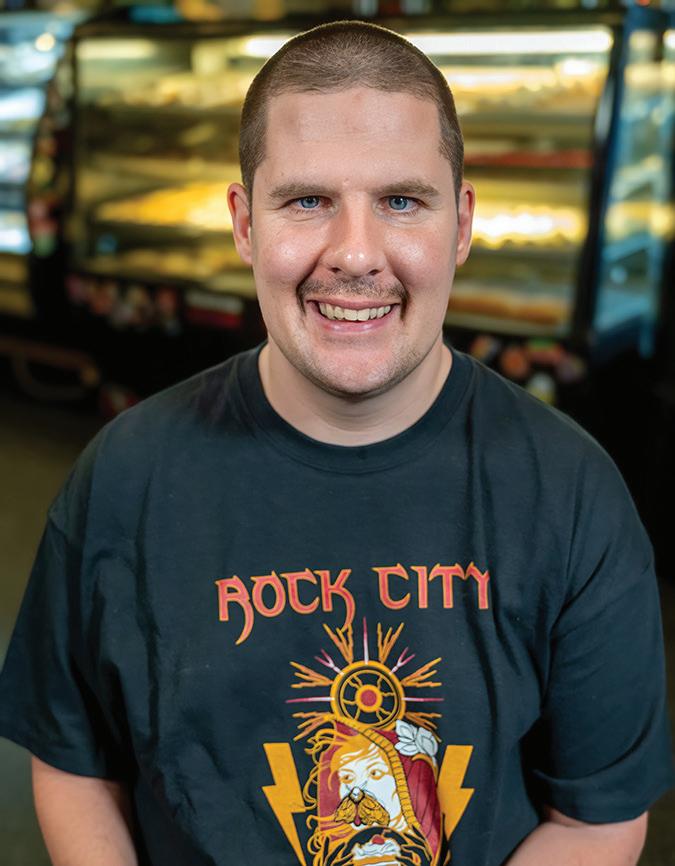
There are probably very few people in West Virginia who can claim “master cake ball roller” as their job title, but Ryan Bush can.
Ryan works for Rock City Cake Company, a fullservice bakery, in Charleston.
Ryan was born with autism. He grew up in St. Albans and graduated from St. Albans High School in 2010.
A former high school teacher encouraged Ryan to pursue getting a job so he could have his own money and stand on his own two feet.
Ryan’s condition qualified him for one of the disability waiver programs through the former Department of Health and Human Resources. His waiver coordinator and his legal guardian were integral in getting him involved with the West Virginia Division of Rehabilitation Services (DRS) for help with finding a suitable job.
According to Alicia Foster, DRS rehabilitation counselor, Ryan had participated in a career exploration program, and he had an interest in working in a food-service setting, like a cafeteria.
DRS also provided Ryan with supported employment services, which are more individualized and hands-on to help consumers with more severe disabilities get a job in a competitive integrated work setting. Some of these services were provided through Job Squad, which is a community rehabilitation program utilized by DRS to deliver these one-on-one services.
After getting to know his unique circumstances, Job Squad identified Rock City as a perfect opportunity for Ryan.
Morgan Morrison, co-owner of Rock City Cake Company, admits they were a little hesitant when approached by Job Squad because they operate a very fast-paced business, and they were not sure what he could do.
“They had a program where they bring an employee in for us,” explained Morrison. “They pay them, I think, for the first three months. They are aided by a job coach. They said if it doesn’t work, no harm, no foul, just give us a chance.”
Through work adjustment training, Ryan went to work at a job site, which was Rock City, where he acquired the skills for a job there, and he had a job coach to help him learn specific work tasks.
Morrison now admits that Ryan is a great fit for the business. She indicated that while he had a job coach, he really did not need a lot of training.
According to Morrison, Ryan’s responsibilities include putting their boxes together, adding stickers with their name and logo to their containers, cleaning, washing dishes and much more.
“He is our official cake ball roller of the company,” said Morrison. “Any truffle or cake ball you see, Ryan has made it. He is so good at this point. He comes in, and he knows what to do.”
Foster believes Ryan’s best work-related qualities include his enthusiasm, his willingness to learn new things and his eagerness to help others.
For Morrison, his work ethic and positive attitude are two of his best attributes.
“Ryan brings the level of dependability that anybody looks for in an employee,” Morrison said. “Not only is he super dependable and always here and always on time, he has the most amazing attitude about it. He comes in every day and, even when we’re all down and tired and stressed, he immediately has the most infectious attitude that puts everybody in a good mood.”
Ryan is very happy at his job, and he plans to keep working there. He is grateful to God, his guardian, DRS, Job Squad, his job coaches, his coworkers and employers for their help and support in getting this job.
Morrison believes Ryan is breaking barriers for people with disabilities in the workplace. She realizes her hesitation in the beginning almost kept her from giving him a chance.
“It’s truly like he’s just as capable as anybody else, and honestly, he’s better than most of the employees we hire,” Morrison explained. “And I wish people out there would realize that and have people like Ryan advocating for them because it’s changed my entire outlook and meeting him is truly something I’ll never forget. Having him as a part of the company is something that I’ll carry with me forever because he’s more than just an employee, he’s truly changed all of our outlooks and … we’re lucky to have him more than he’s lucky to have us.”
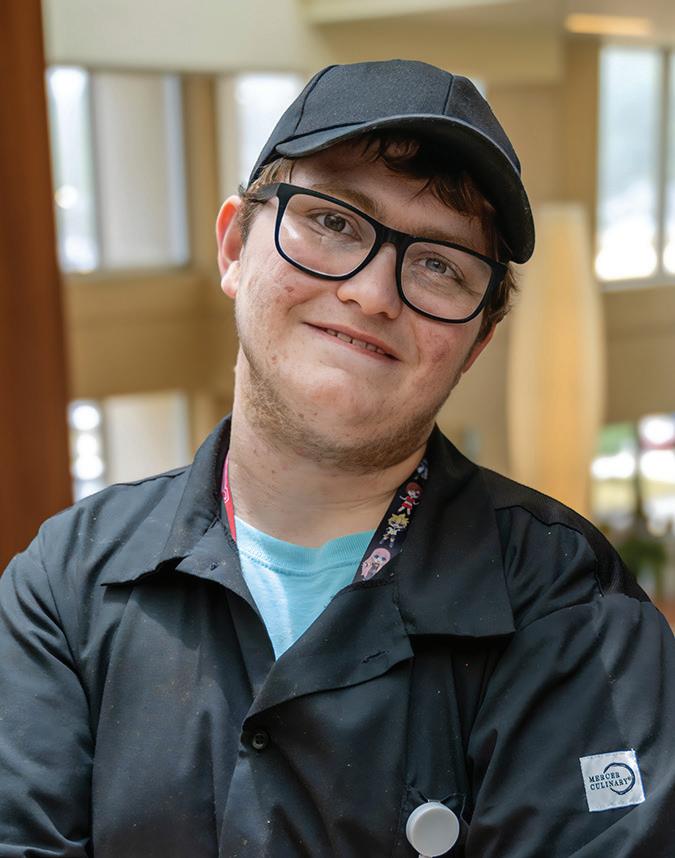
The benefits from a job training partnership have positively changed the course of Travis Stone’s life.
Travis has attention deficit hyperactivity disorder (ADHD) and some difficulty with learning new things. Before graduating in 2022 from Grafton High School, a special education teacher referred Travis to the West Virginia Division of Rehabilitation Services (DRS) for assistance with his transition from school to employment.
According to Melodie Nichols, DRS rehabilitation counselor, Travis needed job readiness training, and he seemed to be ideally suited for the Project SEARCH program, which is an employment preparation program for individuals with disabilities that takes place entirely at a workplace.
Nick Lafferty is the Project SEARCH manager at Ruby Memorial Hospital in Morgantown. He explained that West Virginia’s Project SEARCH program involves a partnership between DRS, the West Virginia Department of Education, Pace Enterprises and West Virginia University Medicine, which is the business partner and the host training site for the program.
Program participants range in age from 17 to 24 and are referred to WVU Medicine by DRS. Individuals who are referred to the program are assessed by hospital representatives and then a class of participants is selected from those applicants.
The goal of Project SEARCH is employment, whether it be at the hospital or in another job setting, so the program focuses on teaching participants transferable skills.
Project SEARCH includes a classroom instruction component, where participants learn soft skills that will help them in the workplace, and then they do three rotations in different departments of the hospital, where they work as interns and learn actual job skills. During the classroom training, they are taught about professionalism, including appropriate hospital behavior and how to conduct themselves in a work setting. They also learn how to develop a résumé, complete job applications and answer interview questions. The hands-on component of the program could involve placement in several different areas of the hospital including the pharmacy, nutrition, nursing, facilities or transportation.
According to Lafferty, Travis was extremely shy and withdrawn when he started the program. He stayed close to a couple of people he knew from the Grafton area. But once he began his first rotation in the pharmacy, he started coming out of his shell.
Travis did his second internship rotation in the nutrition service area, which is where he ultimately earned full-time employment as a dietetic assistant or utility worker.
Nina Harper, nutrition supervisor at WVU Medicine, explained that Travis is responsible for tasks including sweeping, mopping and polishing the floors; emptying garbage and keeping the refuse areas clean; and filling condiment pumps in the cafeteria.
Harper and Nichols both identify his positive attitude as Travis’ best workplace characteristic.
“He is a great overall person,” said Harper. “And he brings positivity that rubs off on the people around him.”
Travis enjoys his job, especially keeping things clean and making customers happy. His coworkers are one of the best things about his job because they are nice and respectful.
Travis believes Project SEARCH is the greatest program. Not only did it teach him job skills, but he learned how to be more confident, how to trust others and how to overcome his shyness.
According to Lafferty, four classes of interns have been hosted at Ruby Memorial Hospital, and he has seen firsthand how the Project SEARCH program changes lives, with Travis being one of them.
“He came in and he had no positive outlook on life, didn’t know what he wanted to do with his life. And when he left the program, he had a job. He was working, he was making the money in his family at that particular time,” Lafferty explained. “He actually took the skills we taught him about filling out an application, filling out a résumé, doing interviewing and transferred those to his dad and now his dad works here too.”
“I’m proud of myself showing up to work every day and being the most positive person I can only be,” Travis said.
Travis plans to continue working, but he hopes to get married and have two children, a boy and a girl, in the future.
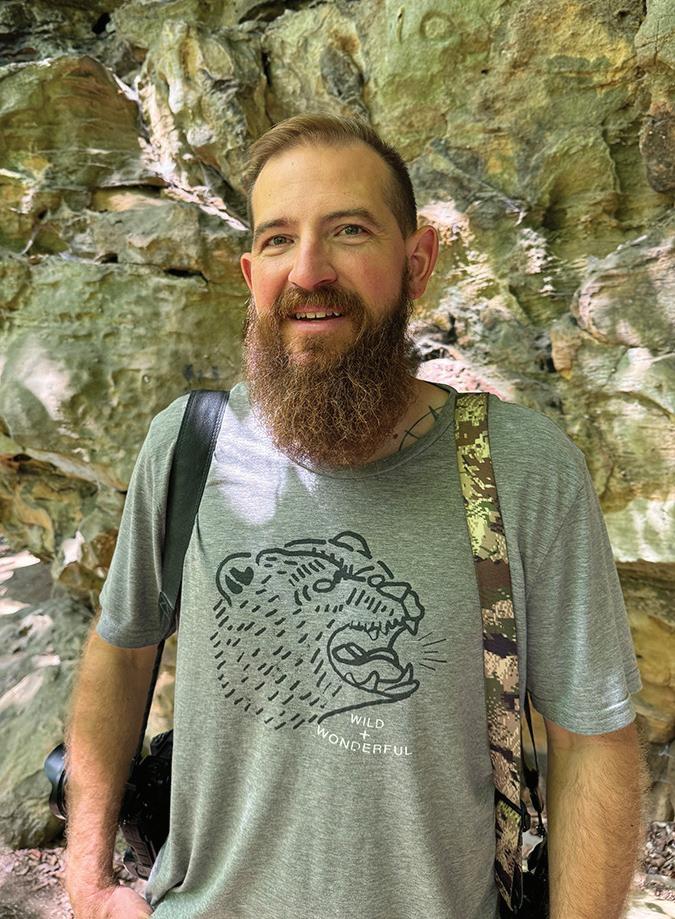
Tyler Evert considers himself lucky to be employed in a profession that he enjoys as much as any hobby that he does in his free time.
In 2015, Tyler got his job with the West Virginia Department of Commerce’s Office of Marketing and Communications, which works closely with state government agencies to showcase West Virginia’s beauty and opportunities.
Tyler is a photographer, videographer and drone pilot. One of the things Tyler enjoys most about his current job is the autonomy he has to accomplish
his responsibilities. He is typically provided with a list of photographs or videos that need to be shot, and he gets to plan when and how to do them. Tyler takes a lot of pride in his work, and for good pictures, timing and weather can determine a photographer’s success or failure.
Prior to his employment with Commerce, Tyler worked as a photographer for the West Virginia Division of Culture and History for about five years, a job he credits the West Virginia Division of Rehabilitation Services (DRS) with helping him get his foot in the door.
Tyler grew up in Hampshire County, where he was a “typical kid.” He loved to spend time outdoors. But Tyler was born with a congenital condition called proximal femoral focal deficiency, which meant that he was born with a short thigh bone. As he got older, the problem became more pronounced, and at the age of 10, he had to choose between three different surgery options to fix the problem. Tyler opted to have part of his leg amputated so he could be fitted for a prosthetic device that would bend at the knee.
“One of the things I really wanted to do when I was 10 was to ride a bike,” explained Tyler. “And it was kind of awkward with one leg being so much shorter, so that was why I chose above the knee, so I could ride mountain bikes.”
Tyler was homeschooled instead of attending a high school. At the age of 15, Tyler really became interested in photography, and he had the opportunity to travel around the state with different photographers, which is why he could not go to high school.
In 2001, he took his general educational development (GED) test and the ACT test for college admission. He went on to take classes at Potomac State College for two years and then to West Virginia University, where he graduated with a bachelor’s degree in journalism in 2007.
Tyler initially got a job with Charleston Newspapers until DRS helped him get an interview with the Division of Culture and History.
Not only did DRS help him get his start with working in state government, but DRS also assisted Tyler with getting a prosthetic leg.
When asked about how his disability has affected his life, Tyler compared his circumstances to photography and explained that having the right equipment is vitally important in both situations. DRS paid what Tyler’s insurance wouldn’t cover to upgrade his prosthetic device on more than one occasion. Just like photography equipment, a prosthesis does not last forever, and the equipment has greatly improved over time.
Tyler admits that one of the best advancements in prosthetic devices occurred when the technology included a microprocessor in the knee, which adapts to his speed as he moves.
According to Meredith Perry, Tyler’s vocational rehabilitation counselor, DRS was able to help replace his prosthetic leg so Tyler could continue working for the Department of Commerce.
Steven Hoffman is executive producer for Commerce’s Office of Marketing and Communications, and he supervises Tyler.
Hoffman considers Tyler to be more than just a photographer and a videographer. He refers to him as an event planner and a storyteller.
According to Hoffman, “Tyler is exceptional.”
He has a vast knowledge not only of the equipment he uses to shoot and edit videos and photographs, but also of West Virginia’s geography and the people he must work with to accomplish his job. Hoffman believes these qualities make him an asset to the state of West Virginia.
Tyler certainly does not let his disability prevent him from capturing the shots he needs. His workday typically starts as early as 4:30 in the morning, and his job frequently requires him to traverse rough terrain, creeks and every other unique part of West Virginia’s landscape.
Tyler describes himself as a husband, father, photographer and lover of life.
“My plans for the future are to just keep doing what I do and hopefully get better and better,” said Tyler. “And every day, just wake up and go out and promote the state of West Virginia to the best of my ability, and hopefully I keep getting better and better at it.”
DRS recognizes the following businesses as exemplary employers and partners as part of National Disability Employment Awareness Month in October 2024.
Diversity Trailblazers:
• Asplundh
• Goodwill Industries of KYOWVA Area, Inc.
• West Virginia University Medicine
Exemplary Employers:
• Daniel Vineyards
• Domino’s Pizza
• Keyser Auto Service Center
• Mane Street Studio
• Mountain State Recovery Center
• Piggly Wiggly
• WDTV 5 News
• WVVA
• Yukon Medical Clinic Folder
Mission
Together, we enable and empower individuals with disabilities to work and to live independently by providing individualized services to consumers and employers.
